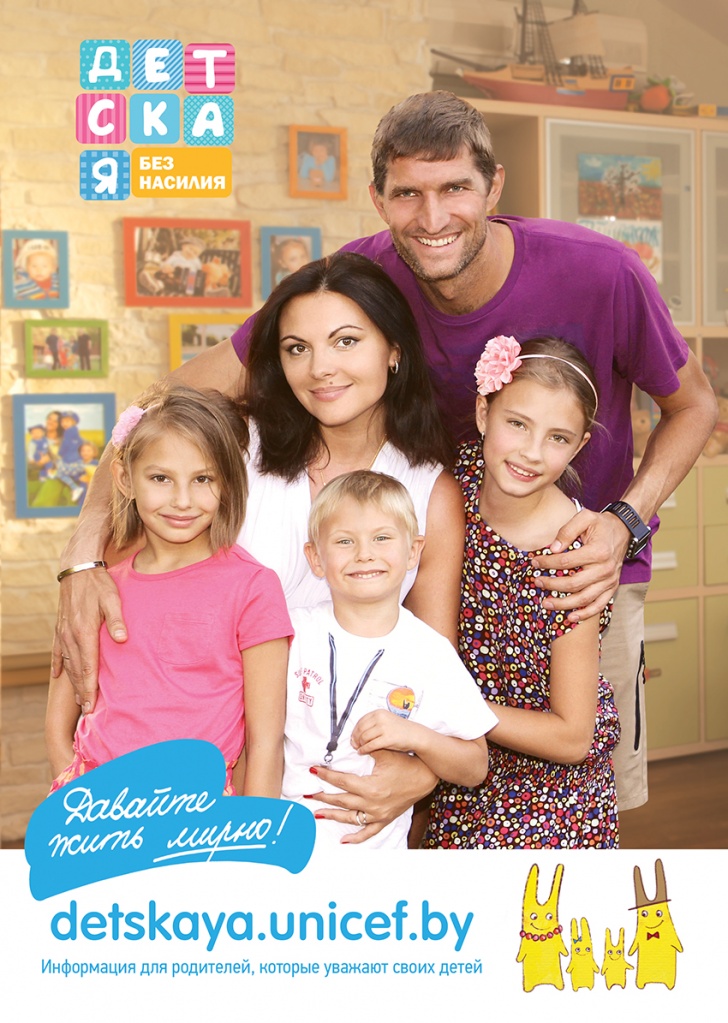The informational campaign “Playroom without Violence” launched in Belarus on September, 9. The campaign’s goal is to counteract violence against children.
“Playroom without Violence” is the second stage of the “Home without Violence” informational campaign which started in Belarus in 2012 within the project “Developing national capacity to counteract domestic violence in the Republic of Belarus”. This broader campaign is aimed to prevent violence against women and children and to counteract its consequences. According to the plan the campaign consists of three stages and the “Home without Violence” consists of three rooms. At the first stage (“Kitchen without Violence” with participation of Julia Vysotskaya) national telephone hotline for domestic violence survivors 8-801-100-8-801 was supported. As a result more than 5 000 calls were received to the hot-line during two years. New stage of the campaign “Playroom without Violence” is aimed at counteraction of violence against children.
As it was mentioned by Aleh Karazei (National coordinator of the project “Developing national capacity to counteract domestic violence in the Republic of Belarus”, Head of the Department for Prevention of the Main Department for Law Enforcement and Prevention of Crimes of the Public Security Police of the Ministry of Internal Affairs of the Republic of Belarus), it is not a coincidence that prevention of violence against children is of particular attention within the projects’ implementation.

“Children and youth are not only victims, but also witnesses of violence in families happens quite often, - said Aleh Karazei. – Furthermore, it is not clearly known what hurts a child more: direct violence or being a witness, constantly seeing father hurting mother and learning this behavior. Childhood is the time when view on future family model is being formed. Later boys copy fathers’ behavior and violate their family members, and girls (just as their mothers) tolerate such treatment”.
Almost half of 15-19 years old girls around the world consider that a husband has the right to beat a wife in certain circumstances. Three of ten adults consider physical punishment necessary to raise children. Around 17% of children in 58 countries suffer from tough physical punishments. This is the worldwide statistics presented in this year September in the UNICEF Global Report on Violence towards Children “Hidden in Plain Sight”.
Cruel physical punishments of children in Belarus are not that common. Nevertheless our statistics is still disturbing. According to the “Multi-indicator Cluster Analysis of Children and Women State” (2012) which was prepared by the National Statistical Committee of the Republic of Belarus with UNCIEF support, one of three children from 2 to 14 years old is being physically punished. When speaking about children from the age of 2 to 4 years the percent of victims is up to 47%. Only one third of children from the age of 2 to 14 years were raised using non-violent methods, without physical punishments and psychological pressure (by asking and explaining).
However, only 8% of respondents think that physical punishment should be used towards children. This means that a lot of parents don’t want to use force, but do not know how to manage without it. Recommendations to those who want to raise a child without violence are collected in brochures developed for “Playroom without violence” campaign. The brochures can be downloaded at the web-page of the campaign www.detskaya.unicef.by.
“I assume a lot of parents would not understand easily, would not accept the role of aggressor, reconsider conflict situation, think over and change their behavior in family and relations with children, – said Yuri Oksamitny, Representative of the UN Children’s Fund (UNICEF) in the Republic of Belarus. – It is a huge amount of work and great responsibility. But happy children, who will become confident adults if raised in trustworthy and sincere atmosphere, are worth it!”
Violence against children is not only a problem of a certain family, its solution should be found at the state level. Aliaksandr Rumak, Deputy Minister of Labour and Social Protection of the Republic of Belarus, noticed that ”issues of motherhood and childhood are crucial points of interest of the government. If a family accomplishes its functions and satisfies its needs, it helps to achieve social prosperity in general, for each family and each child”.
Government authorities, international organizations, civil society organizations and mass media consolidated to solve the problem.
“Work on the informational campaign proved the importance of sustainable and responsible partnership again, – said Elena Kasko, Assistant Representative of the UN Population Fund (UNFPA) in the Republic of Belarus. – We are grateful to everyone who helped to turn our ideas into action and welcome each of you to cooperate for promotion of the “Playroom without Violence” campaign. Information support from mass media, meetings with target groups which can be held with participation of NGOs, and business partnership are all important. The easiest way to support the campaign is to give brochures “Raising Children without Violence” to your family and friends, post their electronic versions or the link to the web-site in social networks. Banners of the “Playroom without Violence” campaign will be prepared and we will share them for further distribution”.
The next and final stage of the “Home without violence” campaign will be launched in 2015. The target audience is men who act aggressively in their families.

